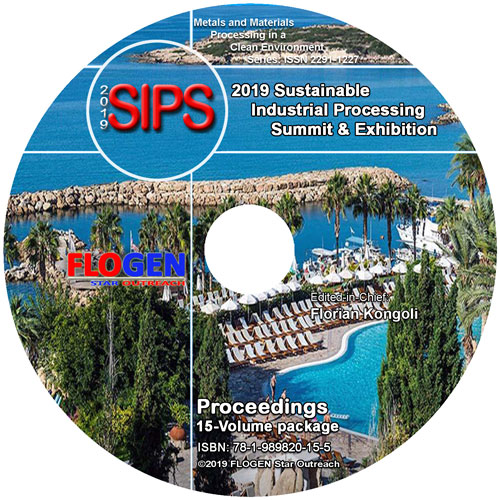2019-Sustainable Industrial Processing Summit
SIPS2019 Volume 4: Kozlov Intl. Symp. / Sustainable Materials Recycling Processes and Products
| Editors: | F. Kongoli, S.V. Alexandrovich, D.V. Grigorievich, L.L. Igoryevich, I. Startsev, T.A. Vladimirovich |
| Publisher: | Flogen Star OUTREACH |
| Publication date: | 20 December 2019 |
| Pages: | 193 pages |
| ISBN: | 978-1-989820-03-2 |
| ISSN: | 2291-1227 (Metals and Materials Processing in a Clean Environment Series) |

CD shopping page
Development and testing of industrial technology of lead cake carbonization
Elena Golubeva1; Pavel Kozlov2; Sergey Yakornov3;1CHELYABINSK ZINC PLANT, Chelyabinsk, Russian Federation; 2UMMC-HOLDING, Moscow, Russian Federation; 3LLC "UMMC-HOLDING", Verkhnya Pyshma, Russian Federation;
Type of Paper: Regular
Id Paper: 143
Topic: 7
Abstract:
Raw materials containing zinc, processed at the Chelyabinsk Zinc Plant, has considerable content of lead. According to the Plant technology, lead is recovered in a lead cake (40-45% of Pb)-solid residue from Waelz-oxide leaching. Lead is contained in cake in sulfate form.
Application of PbCO3, containing raw materials in lead production allows to decrease the flux consumption, and yields dump slags and SO2 discharges with gases during smelting in short-drum furnaces. Carbonization of lead can be carried out by processing the sulfate zinc cake by using a hot solution of Na2 CO3. It is reasonable to carry out the lead cake carbonization in hydrometallurgical production conditions.
For the purpose of the mastering of carbonization of the whole amount of obtained lead cakes in the Chelyabinsk Zinc Plant, the laboratory carried out experimental-industrial testing with definition of optimal carbonization modes.
Analysis of the product obtained during testing has shown that it contains 76% of PbCO3 and 11% of complex hydrocarbonate of lead and sodium.
For the purpose of obtaining a required quality marketable product (40% of Pb, 9% of Zn, 2% of Na, and 4% of S), the following measures are required: maximal extraction of Zn in solution on the stages of Waelz-oxide leaching, preliminary washing of sulfate cake from acid and water-soluble sulfates, and the washing of carbonized product from Na2SO4.
On the basis of experimental results, the the technological and apparatus scheme of the process was developed.
Keywords:
Material; Metal; Technology; Zinc;References:
[1] Syroeshkin M.E., Yumakaev Sh.I., Processing of Waelz-oxides, slag sublimates and lead dusts on lead-zinc plants. Moscow: Metallurgy, 1971. 87 p.[2] Snurnikov A.P., Zinc hydrometallurgy. Moscow: Metallurgy, 1981. 383 p.
[3] Kozlov P.A., Waelz-process. Moscow: "Ore and Metals" Publishing House, 2002. 175 p.